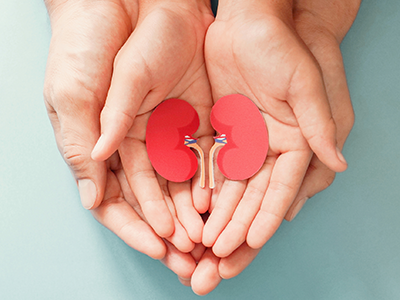What is living kidney donation?
A living kidney donation is when someone donates one of their two kidneys to a child or adult who needs a kidney transplant. Living donors can be a family member, friend or acquaintance. Some people choose to donate a kidney without a specific recipient in mind. People who donate one of their kidneys can live healthy lives with their one kidney that remains.
The living kidney donor is matched with a recipient based on their compatibility that is determined through a series of tests. A donor can donate directly to their recipient if they are compatible, or a swap or exchange can be organized so that incompatible pairs can still have a successful transplant.
Benefits of living kidney donations
The National Kidney Registry (NKR) facilitates living donor transplants and was initially created to overcome incompatibility between donors and recipients. The NKR now also has numerous programs that help make donation easier — including lost wage reimbursement and advanced or remote donation — and offers many donor and recipient benefits.
Among the options for living kidney donation are:
- Non-directed kidney donations: Some donors may know they want to donate a kidney but do not have an intended recipient in mind. These are non-directed donors.
- Directed kidney donations: If you want to donate a kidney and are a match for your intended recipient, this is a direct donation.
- Family Voucher Program: This program provides the opportunity for a non-directed donor to give a kidney to someone in need of a transplant now while assuring their family will be protected should they ever need a transplant in the future. The donor may identify up to five immediate family members (spouse, children, siblings or parents) to receive a voucher for a future kidney transplant.
According to the NKR, becoming a living donor may be the best option for you if:
- You are not compatible with your intended recipient.
- There is a significant age or size discrepancy between the adult donor and the pediatric recipient.
- You are compatible with your intended recipient, but a better match is possible.
- You want to donate now but your intended recipient is not ready for a transplant.
- You want to protect your family members by ensuring they will receive a living donor kidney if they ever need a transplant.
Why should I donate a kidney?
- A living donation makes it possible to schedule the transplant at a convenient time for the donor and recipient.
- Better genetic matches between living donors and candidates may decrease the risk of organ rejection.
- Kidneys from living donors usually work immediately, last longer and have improved outcomes.
- Living donations result in less time on wait lists and less time on dialysis, as well as less negative impact on the recipient.
Who qualifies to be a living kidney donor?
You must be at least 18 years old and in overall good physical and mental health to be a living kidney donor. There are several medical conditions that prevent you from becoming a living donor, including:
- Uncontrolled high blood pressure
- Diabetes
- Cancer
- HIV
- Hepatitis
- Acute infections
It is important that you share all information about your physical and mental health with the transplant center.
How do I get started if I want to donate a kidney?
If you live in the Washington, D.C., area, please consider the Kidney Transplantation Program at Children’s National Hospital, which focuses on the needs of children and teens with kidney disease. We perform 15 to 20 kidney transplants every year, making us one of the largest pediatric programs in the country.
In cooperation with MedStar Georgetown Transplant Institute, donors are evaluated and living donation achieved as often as possible. Our goal is to achieve successful transplantation for pediatric patients so they can resume their normal lives off dialysis.
If you are interested in determining your eligibility to become a living kidney donor at Children’s National Hospital, please fill out our form and someone from our team will follow up with you.
If you live outside the Washington, D.C., area, you can find opportunities to donate through the National Kidney Registry.
 https://riseandshine.childrensnational.org/wp-content/uploads/2020/02/Large-Group-of-People-Celebrating-feature.png
300
400
Rise and Shine
https://riseandshine.childrensnational.org/wp-content/uploads/2017/11/childrens_riseandshine_logo.jpg
Rise and Shine2024-02-27 07:00:312024-02-27 09:36:48Celebrate Rare Disease Day
https://riseandshine.childrensnational.org/wp-content/uploads/2020/02/Large-Group-of-People-Celebrating-feature.png
300
400
Rise and Shine
https://riseandshine.childrensnational.org/wp-content/uploads/2017/11/childrens_riseandshine_logo.jpg
Rise and Shine2024-02-27 07:00:312024-02-27 09:36:48Celebrate Rare Disease Day



Leave a Comment
Want to join the discussion?Feel free to contribute!